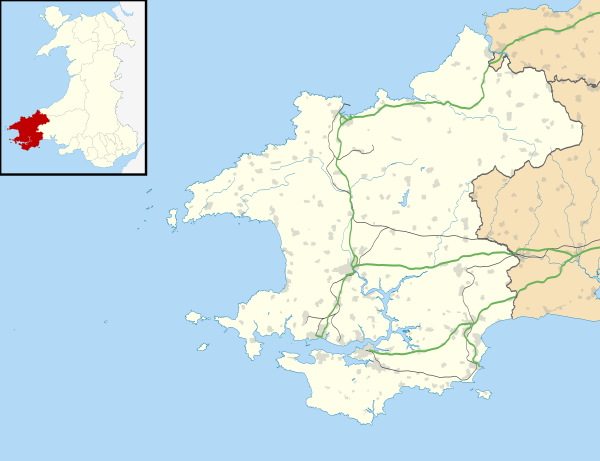Manorbier
| Manorbier | |
| Welsh: Maenorbŷr | |
%2C_Manorbier_-_geograph.org.uk_-_928809.jpg) The Village Street |
|
 Manorbier |
|
| Population | 1,327 (2011)[1] |
|---|---|
| Principal area | Pembrokeshire |
| Ceremonial county | Dyfed |
| Country | Wales |
| Sovereign state | United Kingdom |
| Post town | TENBY |
| Postcode district | SA70 |
| Dialling code | 01834 |
| Police | Dyfed-Powys |
| Fire | Mid and West Wales |
| Ambulance | Welsh |
| EU Parliament | Wales |
| UK Parliament | Carmarthen West and South Pembrokeshire |
| Welsh Assembly | Camarthen West and South Pembrokeshire |
|
|
Coordinates: 51°38′45″N 4°47′48″W / 51.6459°N 4.7966°W
Manorbier (/ˌmænərˈbɪər/; Welsh: Maenorbŷr [mɑɨnɔrˈbɨːr]) is a community, parish and village on the south coast of Pembrokeshire, Wales. The name means the 'Manor of Pŷr'. The village is served by Manorbier railway station on the West Wales Line.
History
Fossils can be found along the stream bed, although some are of poor quality, and along the cliffs to the side of the beach the rock formations are revealed as vertical beds. The evidence of early human habitation consist of many flint microliths, housed in museums around the area, from the Mesolithic and Neolithic ages. The King's Quoit cromlech is the most notable monument in the local area and is to be found to the south east of Manorbier bay and beach.
Later evidence points to occupation of The Dak with the finding of a perforated mace head as well as Bronze age burial mounds on the Ridgeway. Fortifications also seem to have been prominent including an Iron Age enclosure near Manorbier station and the site of a multivallate, meaning multiple ditches, promontory fort at Old Castle Head where there are remains of hut platforms within the ditches. There are also some old lime kilns near the sites of quarries and a restored version in Mud Lane shows how they looked originally. There is also an area of strip lynchets and fields dating back to early Anglo Saxon times and perhaps as early as the Bronze age, which is to the east of the town alongside the road to Lydstep. There is a higher concentration near Manorbier Newton to the north west.
The Norman knight Odo de Barri was granted the lands of Manorbier, Penally and Begelly in gratitude for his military help in conquering Pembrokeshire after 1103. The first Manorbier Castle was motte and bailey style, with the stone walls being added in the next century by later Normans. Giraldus Cambrensis, son of William de Barri, was born in the village in 1146, and called it "the pleasantest place in Wales".[2]
St James's parish church dates from the 12th century and is a Grade I listed building.[3] A large number of other buildings and structures in the parish are listed.[4]
Governance
An electoral ward in the same name exists. This ward stretches inland to St Florence and had a total population at the 2011 Census of 2,083.[5]
Tourism

Modern day Manorbier is a tourist spot and a surfing site. Attractions in the village include Manorbier Castle, and a beach in the cove about half a mile to the south west of the village. Manorbier lies in the Pembrokeshire Coast National Park and on the Pembrokeshire Coast Path.
- Manorbier Church
 Manorbier Castle
Manorbier Castle
Twinned towns
Manorbier is twinned with Vernou-la-Celle-sur-Seine, France.
In popular culture
"Manorbier" is the title of an instrumental track on the album Rewind the Film by Welsh rock band Manic Street Preachers, whose bassist and lyricist Nicky Wire often holidays in nearby Tenby.[6]
See also
- RAF Manorbier, a World War II airfield
References
- ↑ "Community population 2011". Retrieved 20 April 2011.
- ↑ Manorbier Castle
- ↑ "British Listed Buildings: St James' Church, Manorbier". Retrieved 28 March 2016.
- ↑ "British Listed Buildings: Listed Buildings in Manorbier, Pembrokeshire, Wales". Retrieved 28 March 2016.
- ↑ "Ward population 2011". Retrieved 20 April 2015.
- ↑ Nicky Wire (25 May 2012). "Wales Coast Path - a postcard from Tenby by the Manics' Nicky Wire". The Guardian. Retrieved 5 May 2015.
External links
| Wikimedia Commons has media related to Manorbier. |
-
 Manorbier travel guide from Wikivoyage
Manorbier travel guide from Wikivoyage - Map sources for Manorbier
- Photos of Manorbier and surrounding area on geograph.org.uk
- Community website
- Historical information and sources on GENUKI
